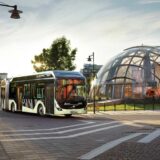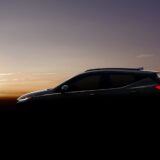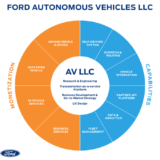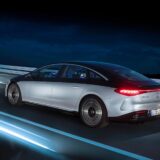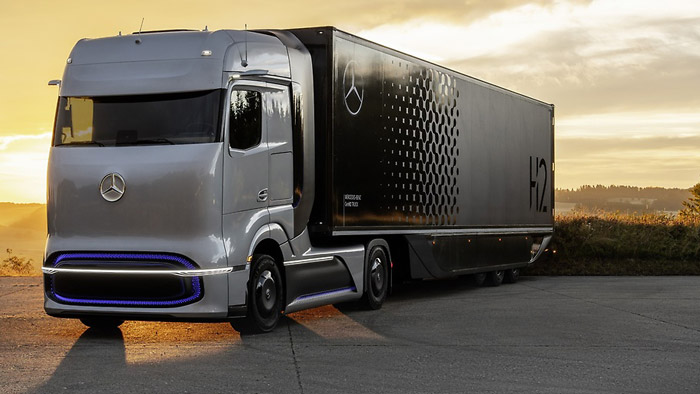
Daimler Trucks unveil technology strategy for electrification
German truck manufacturer Daimler Trucks presented its technology strategy for the electrification of its vehicles, ranging from urban distribution to international long-haul transport, thus reaffirming its commitment to the goals of the Paris Climate Protection Convention. The event focused on the technology for hydrogen-based fuel-cell trucks for the long-haul transport segment.
The Mercedes-Benz GenH2 Truck, which had its world premiere as a concept vehicle on September 16, marks the beginning of fuel-cell drive. With the GenH2 Truck, Daimler Trucks is demonstrating for the first time which specific technologies the manufacturer is driving forward at full speed so that heavy-duty fuel-cell trucks can perform flexible and demanding long-distance haulage operations with ranges of up to 1,000 kilometres and more on a single tank of hydrogen.
Daimler Trucks plans to begin customer trials of the GenH2 Truck in 2023; series production is to start in the second half of the decade. Thanks to the use of liquid, instead of gaseous, hydrogen with its higher energy density, the vehicle’s performance is planned to equal that of a comparable conventional diesel truck.
Daimler Trucks also presented for the first time a preview of a purely battery-powered long-haul truck, the Mercedes-Benz eActros LongHaul, which is designed to cover regular journeys on plannable routes in an energy-efficient manner. Daimler Trucks plans to have the eActros LongHaul ready for series production in 2024. Its range on one battery charge will be approximately 500 kilometres. Additionally, with the Mercedes-Benz eActros for distribution transport, which was already presented in 2018 and has been tested intensively since then by customers in everyday transport operations, Daimler Trucks will start series production of a purely battery-powered heavy-duty truck next year. The range of the series-produced eActros on one battery charge will significantly exceed that of the prototype’s approximately 200 kilometres.
Daimler Trucks is pursuing similar vehicle schedules for the North American and Japanese markets as it is for Europe. By the year 2022, Daimler Trucks’ portfolio in its main sales regions – Europe, the U.S.A., and Japan – is to include series-produced vehicles with battery-electric drive. The company also has the ambition to offer only new vehicles that are CO₂-neutral in driving operation (from tank to wheel) in Europe, North America and Japan by 2039.
As a new worldwide modular platform architecture, the so-called ePowertrain will be the technological basis of all medium- and heavy-duty CO₂-neutral, all-electric series-produced trucks from Daimler Trucks – whether powered purely by batteries or by hydrogen-based fuel cells. It will feature high levels of performance, efficiency and durability. With the ePowertrain, Daimler Trucks plans to achieve synergies and economies of scale for all relevant vehicles and markets.
Martin Daum, chairman of the Board of Management of Daimler Truck AG and member of the Board of Management of Daimler AG, and Sven Ennerst, member of the Board of Management of Daimler Truck AG for Development, Procurement and the China Region, presented the technology strategy at STATION-Berlin in Germany. The speakers included Andreas Scheuer, Germany’s Federal Minister of Transport and Digital Infrastructure.
“We are consistently pursuing our vision of CO2-neutral transport with a focus on the genuinely locally CO₂-neutral technologies battery power and hydrogen-based fuel cells, which have the potential to succeed in the market in the long term. This combination enables us to offer our customers the best vehicle options, depending on the application. Battery power will be rather used for lower cargo weights and for shorter distances. Fuel-cell power will tend to be the preferred option for heavier loads and longer distances. Our customers make rational purchasing decisions and are unwilling to compromise on their trucks’ suitability for everyday use, tonnage and range,” said Daum.
“With our alternative drive concepts from Mercedes-Benz – the GenH2 Truck, the eActros LongHaul and the eActros – and our electric trucks of the Freightliner and FUSO brands, we have a clear focus on customer requirements and are creating genuine locally CO₂-neutral alternatives for them. We have now set out the key technological specifications of our electric trucks so that the requirements are known to everyone involved at an early stage. It is now up to policymakers, other players and society as a whole to provide the right framework conditions. To make CO₂-neutral all-electric vehicles competitive, regulatory and government action is needed, including the necessary infrastructure for charging with green electricity and for the production, storage and transport of green liquid hydrogen,” Daum said.






